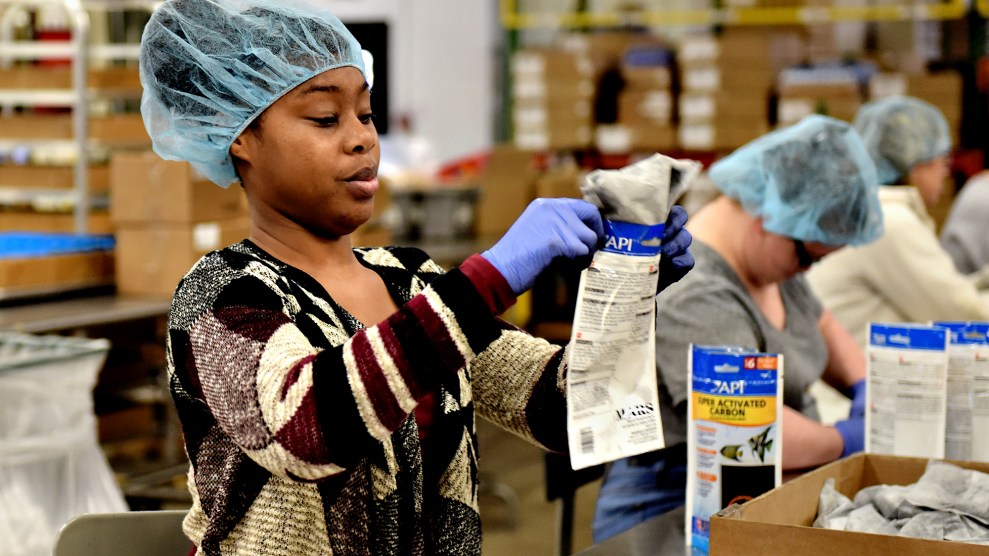|
||||
Calling Uncle Sam
Liberians are begging for Bush’s “moral clarity” to turn their way.
Rose Garden Follies
A couple answers, a heavy dose of shift and dodge, and a few Bushisms.
Jonesing for Imports
When the White House says importing prescription drugs is “unsafe,” does it really mean “not lucrative for the pharmaceutical industry”?
Calling Uncle Sam
In war-torn Monrovia, besieged Liberians held a peaceful demonstration during a lull in the fighting. Perhaps hoping to hold President Bush to his “compassionate” message from his latest African tour, one man held a banner that read: “Uncle Sam must come at once.”
The situation is dire. Half a dozen African nations have already pledged to send about 5,000 troops to help keep the peace in this violent nation, but while Bush has troops moving in the Atlantic towards Liberia, he has yet to commit to putting any of them on the ground.
Unlike in Iraq, where Bush took the iniative to attack the repressive dictator himself, in Liberia, Bush is demanding that President Charles Taylor step down before American troops will set foot on West African soil. Bush skimmed over the crisis in his Wednesday news conference, but he said enough to get his basic point across:
“Charles Taylor must go, the cease-fire must be in place, and we will be there to help ECOWAS. And so we’re working to get those conditions in place. And we will continue working to get them in place until they are in place, at which point we will then take the necessary steps to get ECOWAS in place, so that we can deliver aid and help to suffering Liberians.”
To the Liberians, that must not sound like much. As Julian Borger at The Guardian points out:
- “Unable to find banned weapons and seeking to deflect scrutiny of the administration’s unsubstantiated claims, the Bush White House has increasingly been talking up the humanitarian motives for the invasion, pointing to mass graves that are – unlike the WMD – plentiful across the country.
Yet most of the (up to 300,000) people in those graves were killed either when the US was supporting Saddam Hussein or when it was averting its gaze from the massacre of those it had incited to rebel.
Liberians are being killed now, and angry survivors are piling the corpses outside the US embassy in Monrovia, which is as graphic a message as you could possibly imagine. The message reads: If you are really interested in “moral clarity” is this clear enough for you?”
Last week’s token peacekeeping effort is not proving enough. Bush’s peacekeepers are still miles away on board a ship off the coast. The peacekeepers will only make a difference if they’re dispatched — and risked — on the ground and in the streets.
Bush may not be willing to put men on the ground, in Liberia, it appears that peacekeeping funds are plentiful when they profit a US company. He pledged $10 million to support the Economic Community of West African States (ECOWAS) peacekeeping mission, but instead of sending the much needed cash to ECOWAS representatives in Africa, the State Department gave the funds via a Los Angeles-based private contractor Although the L.A. contractor, Pacific Architects Engineer, is supposed to aid groups in Africa, State Department Spokesman Richard Boucher was less than clear about what that contract will really mean:
Question: Do you expect the contractors to actually end up on the ground in Liberia?
Mr. Boucher: Don’t think I know that yet. Don’t know if it will be done from Sierra Leone or Nigeria or in Liberia. One presumes at some stage, once peacekeepers are there and the situation is safe, that there would be on-the-ground support as well, but I don’t know exactly when.
There are other reasons, besides the humanitarian ones, to stop the bloodbath in Liberia. Liberia’s disintegration could lead to regional instability and an even more fertile breeding ground for hatred towards the Americans who never showed up. In the last few years of fighting Liberia has already lost six percent of its population. As Nicholas Kristof of the New York Times says when criticizing Bush’s policy of “ringing sound bites and hollow pledges:
- “Is U.S. national security at stake in Liberia? Indirectly, yes, for failed states anywhere can threaten us.
A collapsed West Africa could become, like the Taliban’s Afghanistan, a haven for terrorists and narcotics, as well as a sanctuary for infectious diseases. Illegal immigrants would pour by the millions out of West Africa into Europe and America. In today’s world, as John Donne never wrote, no nation is an island.”
But neither the President nor Defense Secretary Donald Rumsfeld seem to be moved to real action, and unfortunately those who do seem powerless to get the peacekeeping troops onto dry land. United Nations Secretary-General Kofi Annan, is predicting the worst: ” The consequences of allowing the situation to spiral out of control are too terrible to contemplate.” Even Secretary of State Colin Powell is advocating that the US do something aside from fidget and make empty promises.
As analysts have been pointing out, the Pentagon’s fears about American soldiers being dragged through the streets of Monrovia — as they were in Mogadishu when the US intervened in Somalia in 1993 — are not entirely merited. Liberia is not Somalia and recent British deployment in Sierra Leone and French troops in the Ivory Coast have proven to be effective in preventing more deaths.
Everyone is saying the time to act is now. Nigerian peacekeepers have been deployed and the Liberian people are still begging for American intervention. Humanitarian workers are predicting the worse if violence continues, warning that 10 percent of Monrovians are in dire straights from lack of food and water. Some aid workers have cited 300 to 400 deaths daily from cholera. As the Christian Science Monitor reminds us, history repeats itself :
- “The fact is the US doesn’t care enough to play the part of policeman and provide a chance for a lasting solution. Instead, the State Department is instructed to patch together the best deal possible. That means accommodating yet again the people who have the guns.
Under the agreement currently being discussed, the rebels will be given the vice presidency and other high government offices. Pursuing political power through the use of violence once again is paying off, and whoever assumes the presidency in Liberia will last only until a bigger thug comes along. In other words, the suffering and the selling out of Liberia goes on and on.”
Rose Garden Follies
President Bush has come out of his hole. He finally answered questions from the media yesterday, at his first solo press conference since before the war in Iraq. Pointed questions from journalists put Bush face to face with touchy issues, ranging from his campaign fund raising tactics to his stance on gay marriage. Some of his answers (as with his solid heterosexuals-only stance on marriage) were crystal clear. Others verged on non-sequiturs, and at worst seemed like attempts to dodge questions of national importance (might we even call him slick?).
Reporters took the opportunity to press Bush about the bogus uranium claim that appeared in his State of the Union address. When asked why Condoleezza Rice isn’t being held accountable for her part in the claim and whether he took personal responsibility for the insertion of the claim into his speech, Dubya said:
“I take personal responsibility for everything I say, of course. Absolutely. I also take responsibility for making decisions on war and peace. And I analyzed a thorough body of intelligence — good, solid, sound intelligence — that led me to come to the conclusion that it was necessary to remove Saddam Hussein from power.
…
Dr. Condoleezza Rice is an honest, fabulous person. And America is lucky to have her service. Period.”
Which means Bush takes responsibility for the bogus “sixteen words,” at least (George Tenet must be pleased). But that still leaves the nation wondering where the mountains of evidence we were once promised have gone.
National security and undefined, unending war are still Bush’s favorite themes. Bush worked the idea that America is under threat into the lion’s share of his answers:
“Steve asked a question about this al Qaeda possible attack. Every day I am reminded that our nation is still vulnerable. Every day I am reminded that our nation is still vulnerable. Every day I’m reminded about what 9/11 means to America. That’s a lesson, by the way, I’ll never forget, the lesson of 9/11, because — and I remember right after 9/11 saying that this will be a different kind of war, but it’s a war, and sometimes there will be action, and sometimes there won’t, but we’re still threatened. And I see that almost every day, Mike. And therefore, that is a major part of my job.”
(Bush, by the way, despite new threats of more terrorist hijackings, is trimming the nation’s new airport security agency by cutting back on security screeners.)
In between being reminded about what 9/11 means to America, Bush has also been out pounding the pavement to round up a staggering $170 million in funding for his presidential campaign. That’s a hefty amount considering Bushy has no opponent. When asked by reporter Michael Allen how he could manage to spend so much cash, our fearless leader responded, “Just Watch.” Allen followed up by wondering if Bushmight not be giving the impression that he’s cozy with millionaires:
“And with 15 fundraisers scheduled between — for the summer months, do you worry about the perception that you’re unduly attentive to the interests of people who can afford to spend $2,000 to see you?”
Bush shot back with:
“Michael, I think American people, now that they’ve realized I’m going to seek reelection, expect me to seek reelection. They expect me to actually do what candidates do. And so, you’re right, I’ll be spending some time going out and asking the American people to support me. But most of my time, as I say in my speeches — as I’m sure you’ve been bored to tears listening to — is that there is a time for politics, and that’s going to be later on. I’ve got a lot to do. And I will continue doing my job. And my job will be to work to make America more secure.”
Still unclear where those millions will go, but Bush was much more specific about his stance on gay marriage:
“I am mindful that we’re all sinners, and I caution those who may try to take the speck out of their neighbor’s eye when they got a log in their own. I think it’s very important for our society to respect each individual, to welcome those with good hearts, to be a welcoming country. On the other hand, that does not mean that somebody like me needs to compromise on an issue such as marriage. And that’s really where the issue is heading here in Washington, and that is the definition of marriage. I believe in the sanctity of marriage. I believe a marriage is between a man and a woman. And I think we ought to codify that one way or the other. And we’ve got lawyers looking at the best way to do that.”
Finally, Bush delivered a few of his trademark, tripping-over-his-tongue Bushisms:
“You know, when I was in Aqaba, I don’t know if you remember, but I asked Prime Minister Sharon and Prime Minister Abbas to go outside. I wanted to watch the body language first and foremost just to make sure we weren’t fooling ourselves, that, you know, when leaders commit to being able to work with each other, you can get a pretty good sense of that commitment.”
This is reminiscent of Bush’s slightly screwy claim that he could “look into” Russian president Vladimir Putin’s soul.
Even harder to untangle was the following comment on Iran:
“The other thing that’s interesting about Iran is that they do have Al Qaida. They’ve admitted they’ve got Al Qaida.
Now, that’s positive, that the Al Qaida’s not talking to anybody. I mean, I would rather them be held somewhere other than out moving around plotting and planning.”
Positive? It’s positive that a member of the “axis of evil” has admitted to having Al Qaida?
To quote Mr. Bush, “And that’s really my only comment I’ve got.”
Jonesing for Imports
Congress revived an old battle over prescription drugs last week, with seniors and those with terminal illnesses on the front lines. Last Friday, the House voted to allow the importation of prescription drugs, which would lessen the huge burden borne by US citizens who pay exorbitant amounts of money for medication. But the bill has yet to make its way through the Senate. And it’s no help that a majority of 53 senators signed a letter sponsored by the pharmaceutical industry’s strongest lobbying organization, the Pharmaceutical Research and Manufacturers Association (PhRMA), that opposes the importation. What’s more — the Bush administration calls the House bill “dangerous.”
The White House and The Big Drugs Industry claim that relaxing importation laws is a safety issue, warning that counterfeit drugs could infiltrate the market, and that the FDA has no way of regulating internationally imported drugs. And, the conservatives tsk, international importation of drugs could make for easy access to such immoral drugs as RU-486, the morning-after pill.
But according to Bart Jansen of Portland, Maine’s Press-Herald, US citizens pay 40 percent more for their medication than Europeans or Canadians, where there are caps on prescription costs. Many individuals already cross the border to Canada, or order drugs online, to avoid the skyrocketing costs. And the FDA already says it probably won’t prosecute individuals who import their own drugs.
Zachary Coile and Victoria Colliver of the San Francisco Chronicle write that pharamacist Stephen Rosati of California says he would do anything to lower the cost of his customers’ prescriptions. Rosati also dismisses concerns about the expansion of a counterfeit market:
“‘I hate to say it, but the counterfeit market has been there for a long time,’ he said. ‘I’m not saying it’s going to be perfect, but the system now is not perfect. It’s up to us to make sure it’s as safe a supply as possible.'”
The pharmaceutical industry counters that it faces high costs to develop new research and maintain jobs within the US, and the guaranteed safety of US-produced medications should compel Americans to pay more for their prescriptions. But, despite its noble and expensive goals of further research and citizen safety, the industry seems to have no qualms about spending large portions of its profits each year on aggressively lobbying the Congress and bolster the Republican party. Maureen Groppe of the Indianapolis Star reports that the industry employed 675 lobbyists and spent $91 million raising various stinks on the hill. And Open Secrets shows that the pharmaceutical industry ranked 11th out of 80 industries in its support of Republicans in 2002 , giving $21 million dollars to various campaigns.
The current controversy is a relative setback for proponents of importation of prescription drugs. Both the House and Senate approved importation in 2000, but specified that the Secretary of Health and Human Services must certify the potential imports as safe. Neither Clinton’s nor Bush’s HHS Secretary would do so. The House bill removed the secretary stipulation and passed with overwhelming support from Republicans. Then PhRMA sprang into action, coordinating with Republican Senator Rick Santorum to get as many Senators to sign the letter opposing importation as possible, reports Seryl Gay Stolberg of the New York Times. Rep. Tom Allen (D.-Maine) says PhRMA has been a nagging pain for some time:
“‘PhRMA is different because they play hardball politically,’ Allen said, noting a lawmaker friend from Florida was defeated last year amid critical advertising from the drug industry. ‘Nobody beats PhRMA.'”
Indiana Republican Representative Dan Burton, who has been targeted by pharmaceutical giant Eli Lilly, agrees with Allen. Burton, well aware of his large constiuency of Lilly employees, still supports the importation of prescription drugs, asserting that there’s no reason to question the safety of imported drugs from Europe and Canada:
“‘You can’t give us an iota of evidence that there’s a problem,’ Burton said to [FDA Associate Commissioner William] Hubbard at a recent congressional hearing. ‘The only real concern is the profits of the pharmaceutical companies.'”












